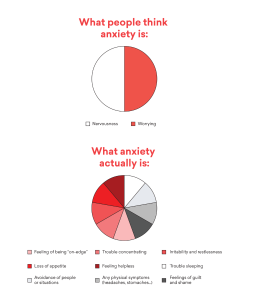Not only should mental health no longer be a taboo topic, but it should become a number 1 priority of responsible companies.
The average person spends roughly 90,000 hours of their lifetime at work. That’s too much time to spend being unhappy at an unhealthy workplace, right?
When talking about healthy workplaces and mental health, the Internet most often lists articles talking about depression and anxiety and how they can lead to:
- physical and mental health problems
- harmful use of substances or alcohol
- absenteeism
- loss of productivity.
However, those kinds of articles are often aimed at mental health experts who have a better understanding of depression and anxiety. The average reader with no expert knowledge probably imagines hardcore clinical cases, the psychiatric ward of a hospital or scenes from movies and TV shows that hardly resemble reality. And since he or she can’t relate to those imagined scenarios, the average reader thinks the aforementioned states can’t possibly apply to them.
However, mental disorders show up in various forms. Milder cases of certain mental issues cause serious problems in daily functioning, but people suffering from it tend to just accept them as part of their life. It doesn’t have to be that way.

Mental health, a taboo in the workplace
Every company wants to have happy employees and they mostly try to achieve that by paying attention to working conditions, benefits, management, communication, etc., while simultaneously ignoring the mental health of their workers.
Unfortunately, mental problems are still seen as a sign of weakness and those who seek help are often stigmatised, even in today’s society. This is an especially touchy subject in the workplace, traditionally regarded as a space where one can’t show any weakness.
Various research also shows that work-life balance is an often-talked about issue, but with very little real-life effort done to achieve it. Companies focus mostly on keeping personal matters separate from business but don’t keep tabs on the opposite: how work affects an employee’s private life. And it’s exactly that work-family spillover that often causes stress and other psychological repercussions.
We should all look at psychological well-being the same way we look at oral hygiene — we take care of our teeth to prevent cavities, not to cure them. Mental hygiene is also all about preventing the preventable. If a company truly wants to be socially responsible, it should start from taking care of those who truly are the core of their business. Hiring someone to work like a machine is one thing, but caring about their mental health, being there for them and supporting their growth is what actually makes for a great company.
Steps a company can take after realizing the importance of mental health
The first step is to satisfy the basic needs of employees, in Herzberg’s theory of motivation called hygiene factors. These are external motivators such as adequate salary and benefits, manageable working hours, a good relationship with the boss/upper management, etc. As you can maybe already tell, these might not make a person satisfied per se, but the lack of them will surely make them dissatisfied with their job.
The second step includes motivators — intrinsic, non-material factors that are mostly related to self-realisation and sense of accomplishment, satisfying our curiosity and need to learn, challenging ourselves and obtaining responsibility at work. They come from within but can greatly affect a person’s overall job satisfaction. In order to truly know how your employees feel regarding these motivators and how satisfied they are at their position, you need to take it a step further and start with a long-term project of conducting company surveys that check employee satisfaction and organizational climate.
After satisfying the extrinsic and intrinsic need of your employees and implementing a survey to help you check the pulse of the company, the next step would be to offer psychological counseling at the workplace.
Psychological counseling at the workplace
Most companies actively work on bettering the external motivators, but only some of them go deeper and recognize the benefits of psychological counseling, and if they do, they probably don’t have it as a formalized process inside the company.
Why is that so?
Again, because mental health is something you don’t talk about. Sadly, it’s still common to turn a deaf ear to these types of problems and it’s easier to pretend they simply don’t exist. Our society still treats psychological well-being as something deeply private and the expectation is that you deal with it alone and far away from others, especially those in your working environment.

Who should do the counseling?
It’s difficult to find a person who wants to take on the counselling role and add another task to their work schedule. It’s also important that the person is an educated expert — ideally, a psychologist educated in psychotherapy. At last, what makes the person an ideal fit is the actual desire and will to do psychological counseling.
Naturally, this also brings up other questions: should that person be an employee, or maybe someone from outside the company? If it’s an existing employee, how will their new role influence his/her relationship with others? Will it change people’s confidence in the HR department?
Will people trust the process?
How do you get people to trust the person taking the role of psychological counselor? And how can they know that everything said during a session stays strictly between the two of them?
What we did to nurture mental health at Degordian
When the COVID-19 pandemic started, we stopped working for our offices and started working from home. This changed our daily routines and made us figure out ways to mantain company culture and, on top of that, the Zagreb earthquake challenged us all mentally. During hard times like these, it’s especially important that organizations acknowledge and address employees’ anxiety and uncertainty. Employees need and want an emotional outlet. That’s precisely why we decided to offer psychological counseling to all our employees. Since it started with the motivation of helping our employees in a time of need, we also offered psychological sessions for other members of their family. We think that if a family member isn’t at his best, it affects the ones closest to him/her, which is why we decided to act as support to the whole family if needed.
As time passed and people started getting the support and psychological counseling they needed, we realized how valuable it was and decided to make it a permanent option for employees.
Here are some tips that may help you implement psychological counseling in your business:
1. Write an official document regarding psychological counseling
Explain what it is, its purpose, as well as the goals and ways of achieving them. Explain how it works, what are some of the topics it will cover, the duration, who will be doing the counseling, that person’s professional background, and, very important, the principles of work.
This is how we did it:
- The purpose of counseling is to enable the growth and development of Degordian employees.
- The goal is to improve job quality and satisfaction, interpersonal relationships, communication with colleagues, communication with clients, teamwork, productivity, coping with stress and everything else related to work.
- The way to achieving those goals is through support and counseling related to everyday business situations, developing certain skills necessary for daily functioning, awareness of one’s own possibilities, etc.
- Psychological counseling is done in individual sessions lasting up to one hour (in person or online).
- The duration of one counseling cycle is up to 10 sessions (the exact number of sessions is defined at the start). After the last session, the individual continues to work on his/her growth independently, but can start a new session cycle if there’s a need to work on another issue. Also, if the problem in question requires deeper and longer attention than our counseling can provide, the person is recommended to consider some form of therapy outside the agency. Of course, the decision of whether to continue counseling outside of working hours is entirely up to the individual.
- The issues and topics that the counseling covers are: interpersonal relationships, assertive communication, emotions at work, conflict resolution, leadership skills, decision making, coping with stress, organization and time management, career guidance, strengthening self-esteem and self-worth and all other topics related to realizing one’s potential at work.

2. Voluntariness and anonymity – fundamental pillars of counseling
The principles of work should be voluntariness and anonymity. Each person should voluntarily decide for himself/herself about coming to the counseling and what topics he/she wants to work on. Everything that is talked about during the counseling is private, not recorded in any way or passed on to anyone else. Everything said within counseling remains between the counselor and the other person.
3. Inform your employees
After the official document is written, you should inform your employees that support is available. It shouldn’t be a one-time thing — do it repeatedly (every 3 – 6 months), as it is a sensitive matter and sometimes people need encouragement to come to counseling. Also, don’t forget about informing new employees about this option during their onboarding process.
4. Be authentic
If you don’t see your company offering counseling and would rather be doing something else to support mental health, it’s probably best that you skip this option. The key to success is that employees see and feel that you really care about their well-being and that you really want to help them in this way. In other words, be authentic in what you do.
5. Management and CEO as ambassadors
Leadership involvement is very important — management and CEO should encourage mental health practices. When leadership is involved and supports psychological counseling, it sends a message that it is okay to seek help when you need it. Not only can the sessions positively impact employee’s mental health, but it can also lead to an increase in productivity and morale.
6. Fight the stigma with openness
In the long term, you should create a working environment where employees can talk openly about mental health. It shouldn’t be such a taboo, but rather an acceptable topic of conversation which your workplace encourages.
What we’ve learned
What we learned so far is that every employee should be able to realise his or her potential, cope with everyday stress, work productively and have the possibility to contribute to the growth of their company in a healthy way. This is incredibly valuable to us and exactly the reason why we wanted to become a company which proactively supports the cause, not only in theory. We’re really proud of implementing psychological counseling here at Degordian and we’re looking forward to finding new activities that help develop our company culture in that direction.
If you have questions about our counseling process or want to know more about how to implement an employee survey, feel free to contact us, we’re always up for a chat!



